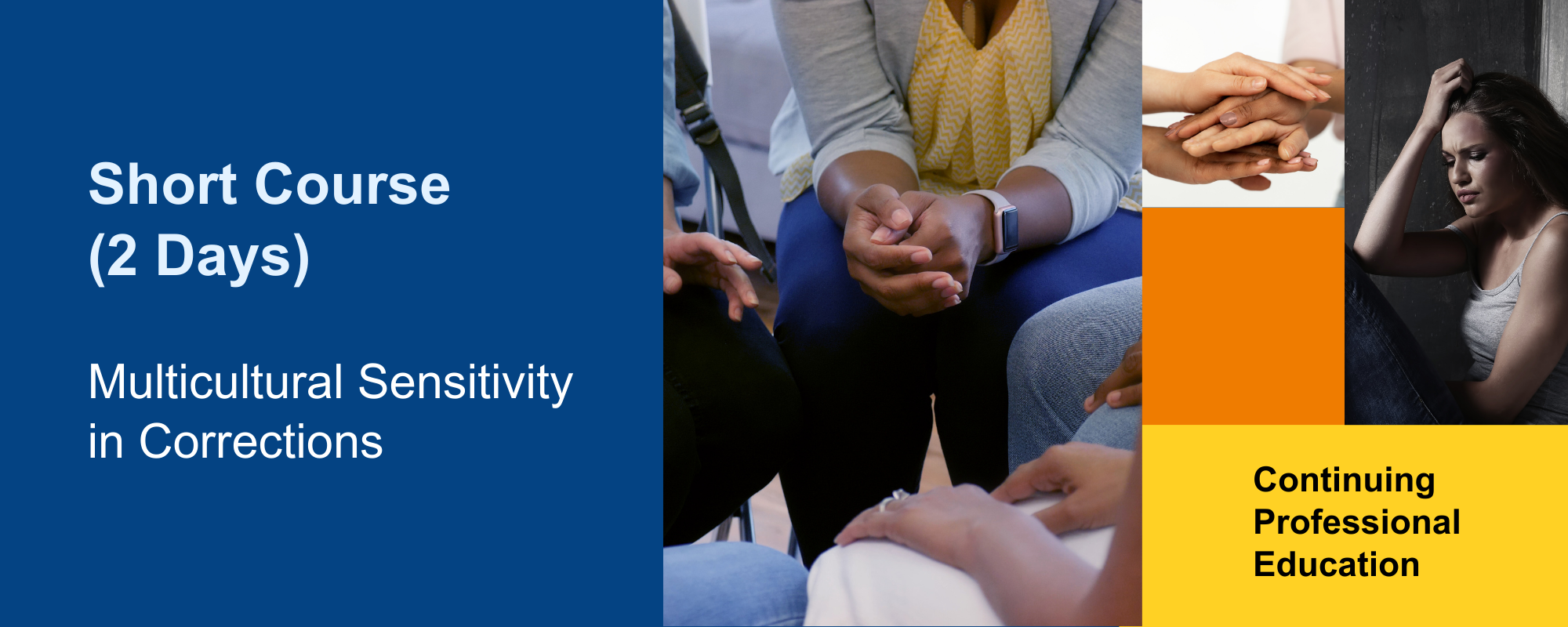[2-day Short Course] Multicultural Sensitivity in Corrections

Registration Guide
(self-sponsored)
Applicable for self-sponsored learners who are registering for themselves.
Registration Guide
(self-sponsored)
Applicable for company-sponsored learners and HR/admin teams who are registering for their staff.
Course Brochure
View the full course details in the link below or share the brochure with your team.
Register Now
Refer to Registration Guide and Register via NUS Lifelong Learning (L3) Application Portal.
About the Course
Cross cultural barriers can impede the development of an effective helping relationship. Unmanaged cultural differences can contribute to how services are terminated prematurely by service users in the corrections setting. Or they can lead to a helping relationship that is mainly organized by service users’ obligations to the system. Such differences are typically experienced in difficulties in rapport building, how the needs of service users are met, how the understanding of service users’ situations is demonstrated, how genuine concern is communicated, and how service users are empowered in their relationships with workers.
This workshop will explore the continuum of multicultural sensitivity and the processes involved in developing competence in multicultural sensitivity.
Participants will acquire skills and knowledge necessary to enhance multicultural practice, with a focus on corrections specific scenarios and the application of multicultural sensitivity in corrections work.
Objectives
This workshop will offer a construct of multicultural sensitivity in corrections work. It will focus on raising multicultural consciousness to help participants recognize and respond to cognitive biases, stereotypes and assumptions. Through experiential exercises, participants can appreciate how such responses can influence their relationships with service users and what processes are useful to these ends. Themes of oppression, discrimination, poverty and racism will be visited. The workshop will also develop participants’ ability to appreciate the worldviews of their service users and communicate such understanding.
Learning Outcomes
Participants would have better examined their relationship with their own cultural heritage, and how this may contribute to unconscious biases and stereotypes, as well as their effects on helping relationships. Participants will also learn to navigate personal level and structural level constructs to acknowledge diversity, respect differences and recognize injustice or power dynamics.
The workshop will also borrow Narrative Practice ideas to introduce a posture that is client-centred and yet influential to better appreciate how service users construct their worldviews, build on their intentions, and respect and support their purposes.
Who Should Attend
Social workers and social service practitioners in the criminal justice system and anyone who has an interest in issues relating to crime, deviance, and criminal justice, who have:
- A degree in Psychology, Social Work, Counselling, or Sociology, or
- Relevant work experience in casework, rehabilitation work and counselling
About the Instructor

Mr Anson Yoo
RegClinSup
Since 2003, Anson has assumed pastoral, clinical and leadership roles with community agencies serving desistors and persons recovering from addictions. He has headed the first halfway house running a nonfaithbased programme for the moderate to high-risk group, and has developed numerous inmate/family programmes, some still currently used in the institutions. Additionally, he runs addiction recovery support groups in the community, and provides psychotherapy and counselling services for individuals, couples and families. A notable part of his current long-term work is with men desisting from sexual offences. Anson is committed to an attachment-focused, collaborative, systemic, trauma-informed, social justice oriented and culturally sensitive approach. Method-wise, he flexibly adopts practices from narrative, systemic, emotion-focused, cognitive-behavioural, structural dissociation, adaptive information processing and Polyvagal traditions. Trained in working with trauma and dissociation, he is also an EMDR Certified Therapist (EMDRIA) and a Certified Brainspotting Therapist. Anson believes that healing and growth only happen in relationships where persons are embraced without judgment regardless of their life experiences, and when they are supported to recall, tolerate and retell their memories.

